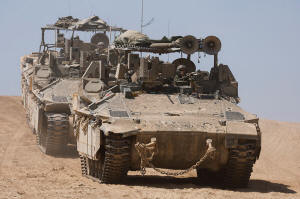Israeli forces vow response to Iran's attack despite calls for restraint
 Send a link to a friend
Send a link to a friend
 [April 16, 2024]
By James Mackenzie [April 16, 2024]
By James Mackenzie
JERUSALEM (Reuters) - Israelis awaited word on how Prime Minister
Benjamin Netanyahu would respond to Iran's first-ever direct attack as
international pressure for restraint grew amid fears of an escalation of
conflict in the Middle East.
Netanyahu on Monday summoned his war cabinet for the second time in less
than 24 hours to weigh a response to Iran's massive weekend missile and
drone attack, a government source said.
While the attack caused no deaths and little damage, thanks the air
defenses and countermeasures of Israel and its allies, it has increased
concerns that violence rooted in the Gaza war is spreading, and fears of
open war between the long-time foes.
Israeli military chief of staff Herzi Halevi said on Monday that "this
launch of so many missiles, cruise missiles and drones into Israeli
territory will be met with a response" but gave no details.
Iranian Deputy Foreign Minister Ali Bagheri Kani told state TV on Monday
night that Tehran's response to any Israeli retaliation would come in "a
matter of seconds, as Iran will not wait for another 12 days to
respond".
But the prospect of Israeli retaliation has alarmed many Iranians
already enduring economic pain and tighter social and political controls
since protests in 2022-23.
Iran launched the attack in retaliation for an airstrike on its embassy
compound in Damascus on April 1 attributed to Israel, and signaled that
it did not seek further escalation.

U.S. President Joe Biden told Netanyahu at the weekend that the United
States, which helped Israel blunt the Iranian attack, would not
participate in an Israeli counter-strike.
Since the war in Gaza began in October, clashes have erupted between
Israel and Iran-aligned groups based in Lebanon, Syria, Yemen and Iraq.
Israel said four of its soldiers were wounded hundreds of meters inside
Lebanese territory overnight, the first known Israeli ground penetration
into Lebanon since the Gaza war erupted, although it has traded fire
with the Lebanese Hezbollah militia.
"We're on the edge of the cliff and we have to move away from it," Josep
Borrell, the European Union's foreign affairs chief, told Spanish radio
station Onda Cero.
French President Emmanuel Macron, German Chancellor Olaf Scholz and
British Foreign Secretary David Cameron made similar appeals. Washington
and U.N. Secretary-General Antonio Guterres also have called for
restraint.
US UNLIKELY TO SHARPEN SANCTIONS ON IRANIAN OIL
White House national security spokesman John Kirby declined on Monday to
say if Biden had urged Netanyahu in talks on Saturday night to exercise
restraint in responding to Iran.
"We don't want to see a war with Iran. We don't want to see a regional
conflict," Kirby told a briefing, adding that it was for Israel to
decide "whether and how they'll respond".

[to top of second column]
|

Israeli armoured personnel carriers (APC) manoeuvre, near the
Israel-Gaza border, amid the ongoing conflict between Israel and the
Palestinian Islamist group Hamas, in Israel, April 15, 2024.
REUTERS/Amir Cohen

Foreign Minister Israel Katz said he was "leading a diplomatic
attack" alongside Israel's military response, writing to 32
countries to place sanctions on Iran's missile program and proscribe
its Revolutionary Guard Corps as a terrorist organization.
U.S. Treasury Secretary Janet Yellen said Iran's actions threatened
stability in the Middle East and could cause economic spillovers.
The U.S. would use sanctions, and work with allies, to keep
disrupting Iran's "malign and destabilizing activity", she added.
However, some analysts said the Biden administration was unlikely to
seek to sharpen sanctions on Iran's oil exports due to worries about
boosting oil prices and angering top buyer China.
In a call between the Chinese and Iranian foreign ministers, China
said it believed Iran could "handle the situation well and spare the
region further turmoil" while safeguarding its sovereignty and
dignity, according to Chinese state media.
Russia has refrained from publicly criticizing its ally Iran but has
also warned against further escalation.
Iran's retaliatory attack, involving more than 300 missiles and
drones, caused modest damage in Israel and wounded a 7-year-old
girl. Most missiles and drones were shot down by Israel's Iron Dome
defense system and with help from the U.S., Britain, France and
Jordan.
In Gaza itself, where more than 33,000 Palestinians have been killed
in the Israeli offensive according to Gaza health ministry figures,
Iran's action drew applause.
Israel began its campaign against Hamas, the Iranian-backed
Palestinian militant group that runs Gaza, after Hamas attacked
Israel on Oct. 7, killing 1,200 people and taking 253 hostages, by
Israeli tallies.
British Prime Minister Rishi Sunak said the Group of Seven major
democracies were working on a package of coordinated measures
against Iran.

Italy, which holds the rotating G7 presidency, said it was open to
new sanctions and suggested any new measures would target
individuals.
Iran's attack prompted at least a dozen airlines to cancel or
reroute flights, with Europe's aviation regulator still advising
caution in using Israeli and Iranian airspace.
(Reporting by James MacKenzie and Maayan Lubell in Jerusalem, Parisa
Hafezi in Dubai, Jeff Mason and Daphne Psaledakis in Washington,
Suleiman al-Khalidi in Amman and Nidal al-Mughrabi and Adam Makary
in Cairo; writing by Jonathan Landay, Lincoln Feast and Kevin Liffey;
Editing by Rosalba O'Brien, Miral Fahmy, Peter Graff)
[© 2024 Thomson Reuters. All rights reserved.]This material
may not be published, broadcast, rewritten or redistributed.
Thompson Reuters is solely responsible for this content. |